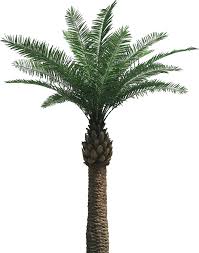palm
英 [pɑːm]
美 [pɑːm]
- n. 手掌;棕榈树;掌状物
- vt. 将…藏于掌中
- n. (Palm)人名;(英)帕姆;(瑞典)帕尔姆;(法、德、俄、捷、芬、挪)帕尔姆
使用频率:

记忆方法
【谐音】啪——手掌拍击的声音
中文词源
palm 手掌,棕榈树
来自拉丁语palma,手掌,棕榈叶,棕榈树,来自PIE*pel,展开,平的,词源同plan,plain.
英语词源
- palm
-
palm: Palm the tree [OE] and the palm of the hand [14] are effectively distinct words in English, but they have the same ultimate source: Latin palma. This originally meant ‘palm of the hand’ (it is related to Irish lám ‘hand’ and Welsh llaw ‘hand’), and the application to the tree is a secondary one, alluding to the shape of the cluster of palm leaves, like the fingers of a hand.
The Latin word was borrowed into the Germanic dialects in prehistoric times in the tree sense, and is now widespread (German palme and Dutch and Swedish palm as well as English palm). English acquired it in the ‘hand’ sense via Old French paume, with subsequent reversion to the Latin spelling. The French diminutive palmette denotes a stylized palm leaf used as a decorative device, particularly on cornices.
It was borrowed into English in the mid-19th century, and is thought to have formed the basis of English pelmet [20].
=> pelmet - palm (n.1)
- "flat of the hand," c. 1300, from Old French palme (Modern French paume), from Latin palma "palm of the hand," also "flat end of an oar; palm tree," from PIE *pel- "to spread out; flat" (cognates: Greek palame "open hand," Old Irish lam, Welsh llaw, Old English folm, Old High German folma "hand," Sanskrit panih "hand, hoof"). Palm oil is earlier in the punning sense of "bribe" (1620s) than in the literal sense of "oil from the fruit of the West African palm" (1705, from palm (n.2)).
- palm (n.2)
- tropical tree, Old English palma, Old French palme, both from Latin palma "palm tree," originally "palm of the hand;" the tree so called from the shape of its leaves, like fingers of a hand (see palm (n.1)).
The word traveled early to northern Europe, where the tree does not grow, via Christianity, and took root in the local languages (such as Old Saxon palma, Old High German palma, Old Norse palmr). Palm Sunday is Old English palm-sunnandæg.
In ancient times, a leaf or frond was carried or worn as a symbol of victory or triumph, or on feast days; hence figurative use of palm for "victory, triumph" (late 14c.). Palm court "large room in a hotel, etc., usually decorated with potted palms" first recorded 1908. - palm (v.)
- "impose (something) on (someone)," 1670s, from palm (n.1). Extended form palm off is from 1822.
权威例句
- 1. He cupped her chin in the palm of his hand.
- 他用手心托着她的下巴。
- 2. Dornberg slapped the table with the palm of his hand.
- 多恩伯格用手拍着桌子。
- 3. She placed her hands palm uppermost in her lap.
- 她把手掌心向上放在大腿上。
- 4. He emptied the contents out into the palm of his hand.
- 他把东西都倒在手心里。
- 5. He could feel the beads digging into his palm.
- 他能感觉到珠子硌得手心生疼。
